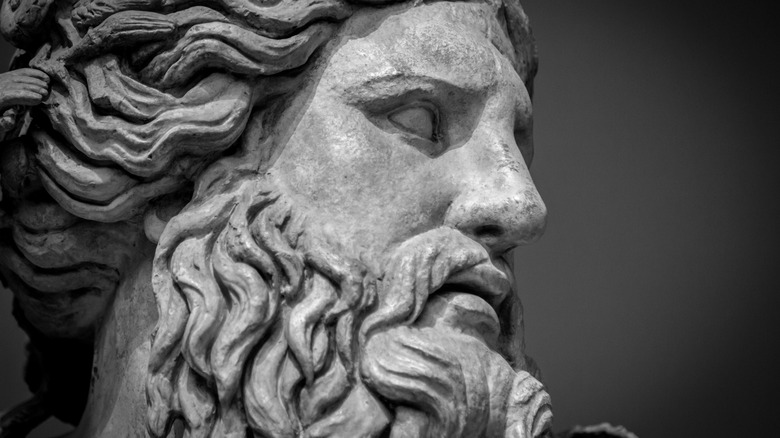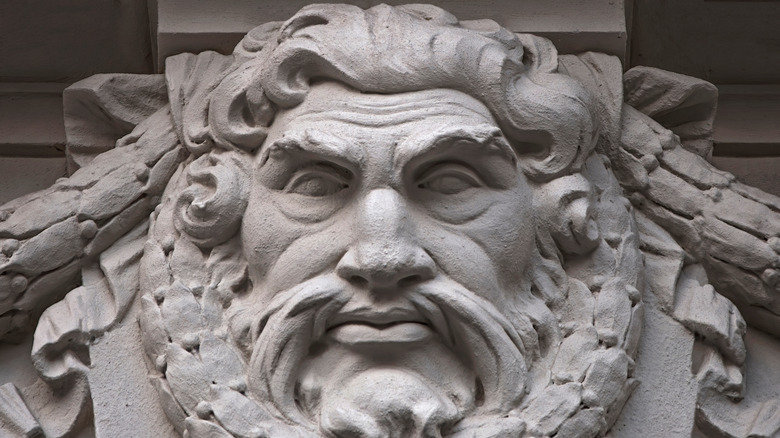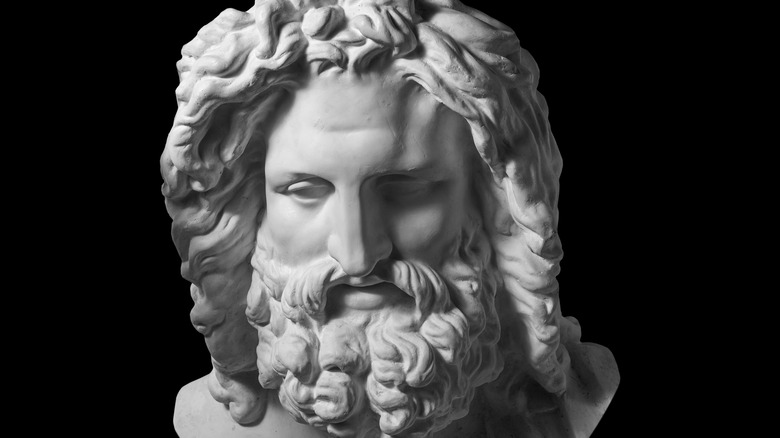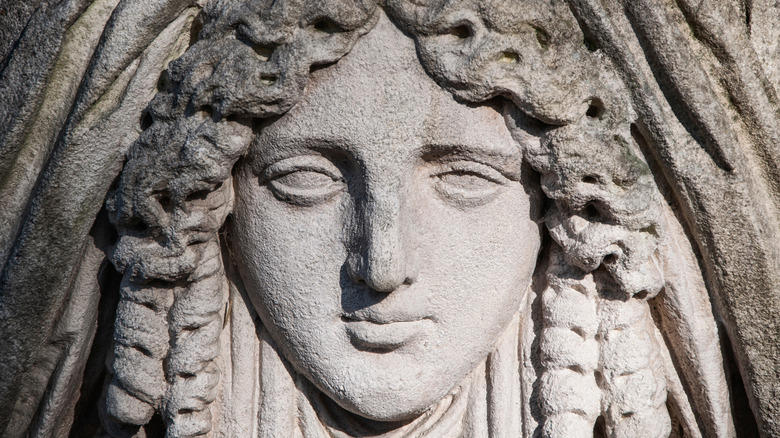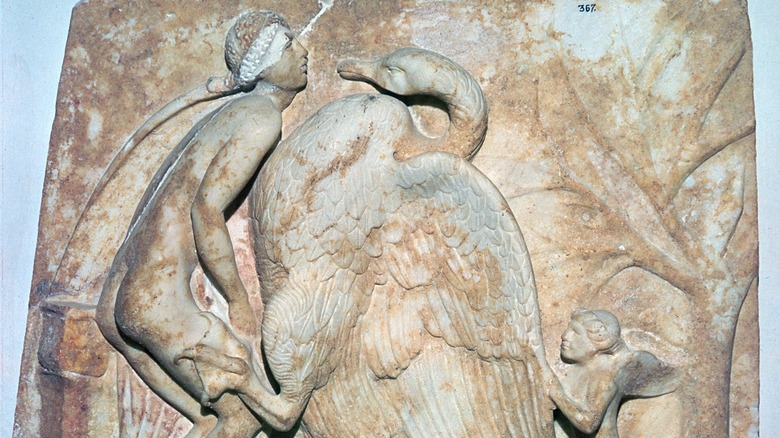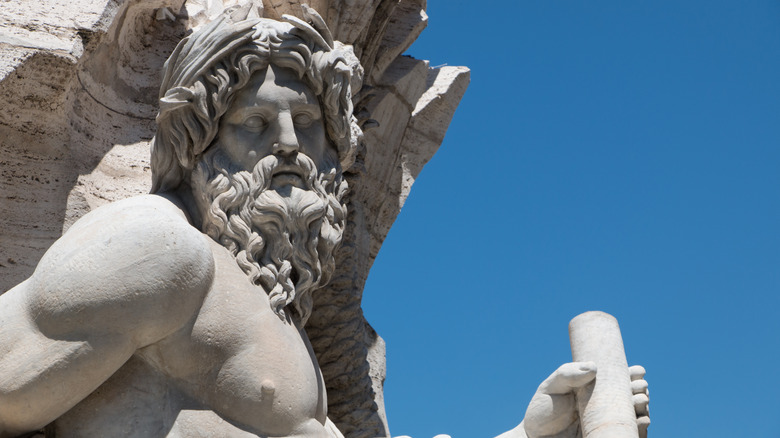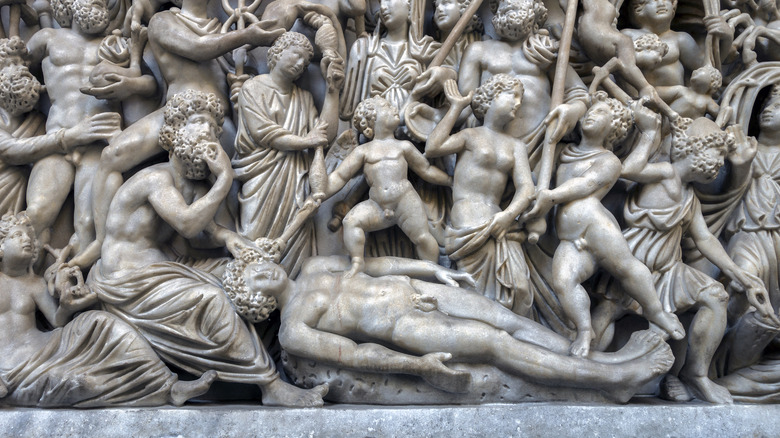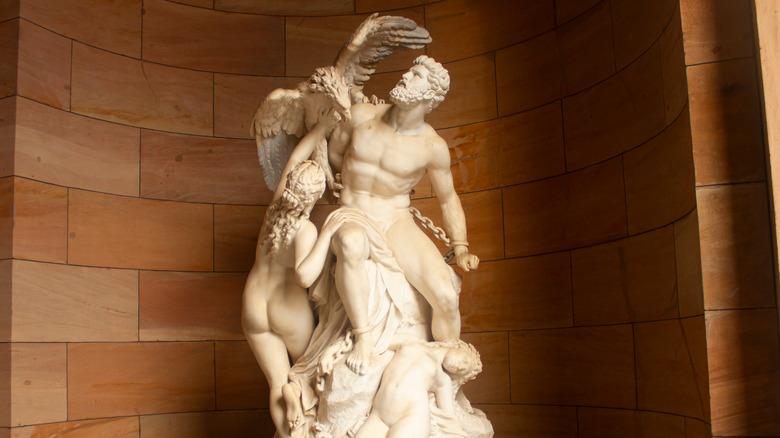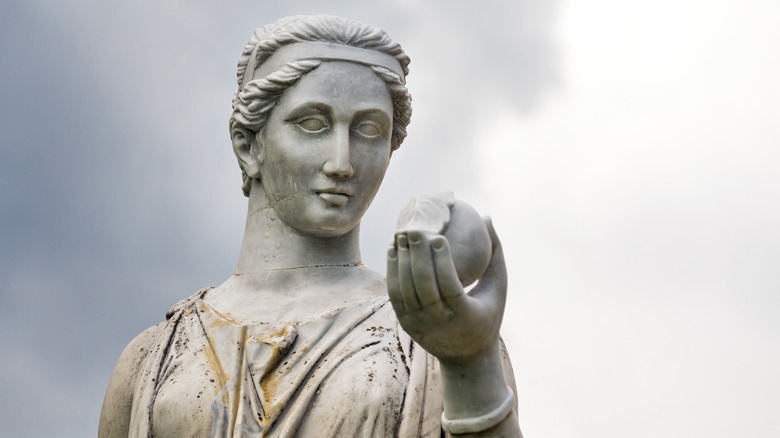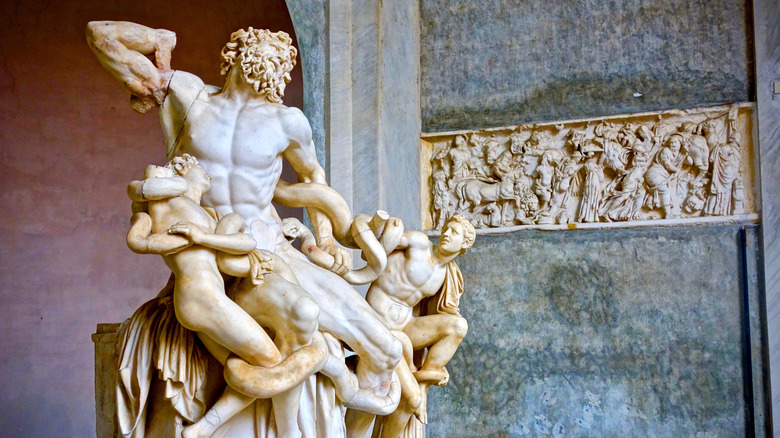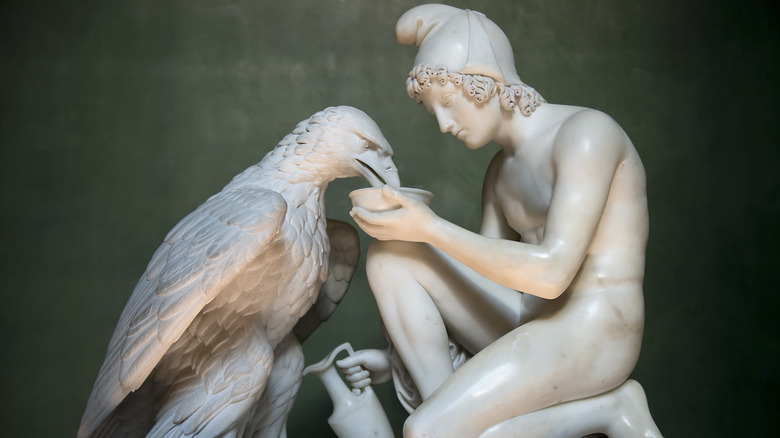The Mythology Of Zeus Explained
Most people know that Zeus was a god in ancient Greek mythology. He was the ruler of all the other gods on Mount Olympus, and everything scholars know about him comes from ancient documents and artifacts. However, many ancient myths have more than one version. It wasn't uncommon for different writers to tell the same story with one or more key differences. This type of storytelling permitted people to creatively express themselves, and it was also seen in ancient theater productions, according to The Collector. For this reason, the mythology of Zeus has some inconsistencies among sources.
So, who was Zeus, and what type of impact did he have on the ancient world? Zeus was a powerful god who loved women and pretty much did whatever he wanted to satisfy his appetites. He also often disregarded the feelings of others to fulfil his own needs. Learn more about the god of gods below.
Zeus was one of 12 gods who lived on Mount Olympus
Zeus and the other Olympian gods lived on Mount Olympus. This location is either the same Mount Olympus that physically exists in Greece today or it was an acropolis in the sky, according to Greek Legends and Myths. The Greek gods made Mount Olympus their home during the Titanomachy, which was a war between the Titans — an older group of Greek gods — and Zeus and the 12 Olympian gods. In addition to Zeus, the Olympian gods include Hera, Poseidon, Demeter, Athena, Apollo, Artemis, Ares, Aphrodite, Hephaestus, Hermes, and either Hades, Hestia, or Dionysus, depending on the source, according to Prep Scholar.
Mount Olympus was an acropolis with palaces and other structures, including Zeus' palace. This palace featured a huge courtyard that could accommodate thousands of gods. The central hall was covered in gold, and it was designed to give Zeus and visiting gods a vantage point to monitor what was happening on Earth. The 12 gods ruled humanity and became involved in their lives.
This pantheon often did not get along with one another and frequently clashed, and the ancient Greeks blamed many of their issues and natural occurrences on the gods' inability to get along. The thought process was that if the gods couldn't make peace with one another, then how could humans do it?
Zeus was king of all the Olympian gods, the god of hospitality, and the god of oath-keeping
Zeus was a powerful god who ruled the Olympian gods. He controlled the sky and elements such as thunder and lightning, which is why he is often depicted with a thunderbolt in his hand. Zeus was easy to anger, and was known to throw thunderbolts onto humans from Mount Olympus if they acted inappropriately or in a manner he didn't like.
However, Zeus was also the god of hospitality, according to Prep Scholar. He exacted revenge if guests were not treated properly or if guests took advantage of their hosts' hospitality. Some believe that Zeus and his messenger Hermes would pretend to be humans to ensure that mortals correctly followed the rules of hospitality.
In addition, Zeus was the god of oath-keeping. He would punish people who lied, broke a vow, or were dishonest in their business dealings. Cheaters and liars did, however, have a way to placate Zeus. All they needed to do was produce a statue of him and place it in a sanctuary. City states such as Athens and Crete also accredited Zeus with other titles, such as the god of farming and the god of the sun.
Zeus' parents were the Titans Rhea and Cronus
The Titan deities Cronus and Rhea were Zeus' parents. Cronus was a jealous and greedy god who didn't want any children because he thought one of them would usurp him. So, every time Rhea gave birth, he would eat his child. Rhea was unhappy with this behavior, so she devised a plan with the help of fellow Titans Uranus and Gaea, according to Greek Gods Info. When Zeus was born, she dressed a stone in a diaper to trick Cronus into thinking it was his son, and secretly sent Zeus to Crete.
Demons known as Curetes made noises with their shields to muffle baby Zeus' crying, and nymphs took care of Zeus. When he was old enough, Zeus battled Cronus and the Titans in a war known as the Titanomachy. At one point Zeus helped his siblings escape from their father's stomach by forcing Cronus to spit them out. United, they were able to defeat their father. Zeus subsequently defeated giants and a monster named Typhon, and he and his brothers and sisters were ready to rule Earth.
Zeus ate his pregnant wife, Metis
Metis was the daughter of the Titans Oceanus and Tethys. A wise being, Metis helped Zeus while he battled Cronus for the throne. When the war ended, the pair wed. But while it seemed she would be a great match for her husband because of her advisory capabilities, a prophecy claimed she would have two strong and powerful children, including a son who would steal his throne, according to Mythology.net. Meanwhile, Metis found out that Zeus had many other lovers, so she avoided his bed by using her shape-shifting abilities to change into different animals.
Eventually, they engaged in a shape-shifting duel. Zeus tricked Metis to turn into a fly, and he swallowed her. While in his belly, Metis was pregnant with Athena. She built a forge of fire within Zeus' stomach, which became painful for the god. Metis also banged a hammer, and the pain eventually traveled to Zeus' head. Zeus told Hephaestus to use an axe and strike his skull. Out of his wound came Athena, who wore a complete suit of armor made from the forge in her father's belly.
Metis stayed in her husband's stomach. She was still in love with him despite his infidelities. She kept counseling Zeus but did not produce any other children, so the prophecy that he would have a son who would usurp him did not come to fruition. But Metis was far from being Zeus' only wife.
Zeus married his sister, Hera, but he cheated a lot
As Metis knew, Zeus loved women, and he wanted to make his sister, Hera, his wife. Hera, who was the goddess of marriage and childbirth, repeatedly refused his proposals. Zeus had a reputation for cavorting with a lot of women, and Hera wanted nothing to do with it. Still, he chased her for hundreds of years. One day he decided to trick Hera by disguising himself as a defenseless, damaged bird. When Hera found the bird, she took care of it and nurtured it. Zeus then revealed his true nature, and Hera fell in love with him and agreed to become his wife, according to Greek Boston.
After the wedding, things took a turn for the worse due to Zeus' philandering ways. He slept with humans, goddesses, and nymphs. This made Hera jealous, and she exacted revenge on the women Zeus spent time with, as well as they children they produced together. This includes women such as Calisto, Danae, Alcmena, Leda, and Europa, and Alcmena's son, Herakles. Zeus' dalliances also included the Trojan prince Ganymede.
Zeus turned into a swan and raped Leda, and their daughter became Helen of Troy
Zeus was attracted to Leda, the Queen of Sparta, so he transformed into a swan and forced himself upon her without her consent. Some versions of the myth call it a seduction instead of a rape, according the Free Library, but two famous poems by R. M. Rilke and W. B. Yeats infer that the relations were not consensual. The rape took place on the banks of the River Eurotas, according to World History Encyclopedia. On the same night, Leda would also sleep with her husband, King Tyndareus.
After lying with both her husband and Zeus, Leda produced one or two eggs and had four children: Helen, Clytemnestra, Castor and Pollux. Many believe Zeus was the father of Helen and Pollux, while Tyndareus was the father of Clytemnestra and Castor, according to Greek Legends and Myths. There is also another version of the myth in which the goddess Nemesis lays the eggs after cavorting with Zeus, and Leda takes care of these eggs until the children are born. The most famous of these children was Helen, who becomes known as Helen of Troy. Her incredible beauty sparked the Greek and Trojan War.
Zeus abducted and raped Europa, and had a son who became King Minos
By now you're familiar with Zeus' voracious appetite for women, and Leda wasn't the only woman he forced himself upon. He also raped Europa, who is alternatively described as a Phoenician princess, the daughter of Phoenix, and the daughter of Ocean and the Titan Tethys, depending on the myth, according to World History Encyclopedia. Zeus spotted Europa hanging out with some friends by the sea, and he instantly wanted her. To gain her favor, he either transformed into a bull or sent a bull to her side to seduce her.
Europa liked the bull, which she believed was a kind and docile animal. She climbed onto its back, and the bull entered the ocean before flying into the air, traveling away from Phonecia. The bull then dropped into the ocean, and together with Europa swam to Crete, where Zeus raped her. Europa and Zeus ended up having three children, including the future king of Knossos, Minos. They also produced Rhadamanthys, who became a judge of the underworld, and Sarpedon, a warrior.
According to the myth, the bull turned into the constellation Taurus. The story may also reflect real events that occurred involving Minoan or Mycenaean Crete raids on Phoencia or attacks on Crete.
Zeus destroyed mankind when humans became greedy and disobedient
Zeus did not get along with Prometheus, who was the last surviving Titan. Part of the problem was that Prometheus created mankind with Athena, which aggravated Zeus because he thought that humans were unkind, greedy, and did not have any loyalty to the gods. Zeus was so annoyed with people that he decided to extinguish the human race with a flood, according to Ancient Origins. Prometheus' son, Deucalion, tried to dissuade Zeus from destroying mankind. However, Zeus' mind was set.
With his father's advice, Deucalion, who is similar to the biblical Noah, built an ark. He and his wife, Pyrrha, were able to survive the flood and the rain, which lasted for several days and nights. Following the destruction of mankind, the couple prayed to the gods for humans to come back. Finally, Zeus relented when he heard their plea at the temple of the goddess Themis. Deucalion and Pyrrha were instructed to throw stones, which eventually turned into men and women, restoring the human race.
Zeus cruelly punished Prometheus for giving fire to humans
Prometheus was tasked with providing gifts to humans so that they could lead productive lives. Seeing how vulnerable man was, Prometheus stole fire from Hephaistos and Athena's workshop on Mount Olympus, according to World History Encyclopedia. He concealed the fire in a hollow fennel stalk and gave it to humans to make their lives easier. Prometheus also taught mankind to use fire to make metal objects.
Prometheus' fire theft enraged Zeus so much that he punished him severely. First, he chained Prometheus to a rock or pillar. Then, he sent an eagle to eat Prometheus' liver. Since he was immortal, the liver grew back every day, so each night the eagle would eat it all over again. Many years later, Hercules killed the eagle, putting Prometheus out of his misery. In another version of the story, Zeus punished mankind's fire acquisition by telling Hephaistos to create a woman. This woman, Pandora, was made from clay and represented everything negative in life, including war and death.
In ancient Athens, potters worshipped Prometheus because they used fire in their kilns, an essential tool to their trade. The Greeks also held a torch race to honor the Titan. He's often depicted in artwork suffering from Zeus' punishment and is the subject of the poem "Prometheus Bound" by Aeschylus.
A Vengeful Hera revolted against Zeus, drugged him, and bound him
It is believed that Hera and Zeus had four children together, according to Learnodo Newtonic. They were Ares, the god of war; Eileithyia, the goddess of childbirth; Hebe, the goddess of eternal youth; and Hephaestus, the god of fire. Even though Zeus had dalliances with a wide variety of women, Hera never strayed. However, she never let go of the fact that Zeus had trapped her into marriage.
She was so bitter that when Zeus lashed out at other gods, she decided to team up with them against her husband. Hera drugged Zeus so the other gods could strap him to his bed. They also took his thunderbolt. Fortunately for Zeus, he had an ally named Briareus, whom Zeus had helped escape from prison. Briareus learned that Zeus was in trouble and released him from the bed. When Zeus awakened, he was enraged. In retaliation, he put gold shackles on Hera and hung her from heaven. Even though she cried throughout the night, no one had the courage to help her. The following day, Zeus told Hera he would take the shackles off but only if she promised that she would never plot against him again.
Zeus unwillingly burned his lover Semele to death
Semele was another object of Zeus' obsession. The god spotted the Phoenician princess after she slaughtered a bull in sacrifice and bathed in a river to cleanse herself. He transformed into an eagle to spy on her, and eventually the pair connected and became lovers. When Zeus' wife Hera found out about their relationship, she became vengeful, according to Mythology Source. Her jealously increased when she found out Semele was pregnant.
Hera traveled to Thebes and dressed like an old woman. She integrated herself into Semele's life and became her friend. When Semele revealed that her baby daddy was the king of gods, Hera challenged the girl, asking her whether it was really Zeus or a lesser god pretending to be him. This made Semele think twice about the situation, so she decided to ask Zeus the truth. She asked him for a favor, and he swore a sacred oath that he would do it, even though he didn't know what she was about to ask.
Semele then asked Zeus to reveal his true self to prove he was in fact the king of gods. Zeus tried to change her mind, but she wouldn't. And since he had made a sacred oath, Zeus had to follow through. He tried to reveal as little as possible in order to protect Semele, but his thunderbolts burned her to death. He was able to save their child, Dionysus, who was born out of Zeus' leg.
Zeus abducted and fell in love with a boy named Ganymede
Zeus wasn't only interested in women. He also had a penchant for a beautiful boy named Ganymede, who came from Troy. This myth is different in that it involves a relationship with a human of the same sex, who is very possibly an adolescent, notes The Collector. Ganymede is repeatedly described in various versions of the myth as young and beautiful and almost godlike. Zeus thought Ganymede was too good for Earth, so he either transformed himself into an eagle or sent one to abduct Ganymede and take him to Mount Olympus.
Zeus asked Ganymede to be his cupbearer, responsible for pouring nectar into the cups of Zeus and other gods. Zeus also promised to make Ganymede immortal and eternally young. Ganymede was just one of Zeus' many lovers who was able to live at Mount Olympus and was given immortality.
This myth is important because at the very least it shows a tolerance for same sex love in ancient Greece. However, it's also possible that Ganymede was a child, which doesn't sit well with modern readers of the myth.
